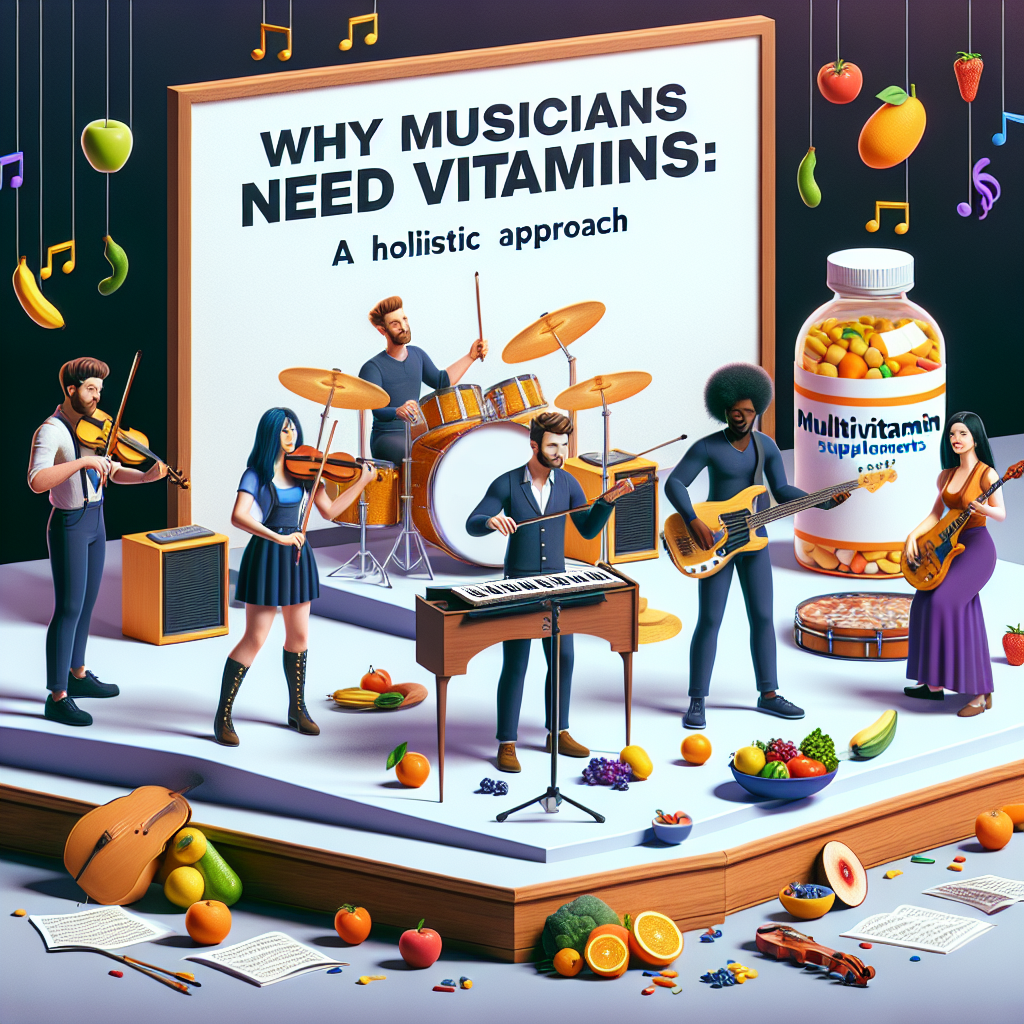Why Musicians Need Vitamins: A Holistic Approach

Discover why vitamins are essential for musicians and how a holistic approach can enhance your performance. Learn more about the importance of nutrition in music and start your journey towards a healthier lifestyle. Click here to explore more.
The Essential Role of Vitamins in Enhancing Musicians’ Performance: A Holistic Perspective
Musicians, like athletes, require a certain level of physical and mental stamina to perform at their best. The demands of long rehearsals, late-night performances, and the stress of creativity can take a toll on their health. This is where a holistic approach to health, particularly the intake of essential vitamins, comes into play.
Vitamins play a crucial role in maintaining overall health. They aid in the body’s metabolic processes, boost the immune system, and contribute to the health of skin, bones, and blood cells. For musicians, these benefits translate into enhanced performance, increased energy, and improved focus.
Vitamin B complex, for instance, is known for its role in energy production. It helps convert food into fuel, allowing the body to stay energized throughout the day. This is particularly beneficial for musicians who often have to endure long hours of practice and performance. Moreover, B vitamins are also essential for brain health. They support the nervous system and aid in the production of neurotransmitters, which can help musicians maintain focus and mental clarity during their performances.
Vitamin C, on the other hand, is a powerful antioxidant that helps protect the body against free radicals, which can cause damage to cells. This is particularly important for musicians who are often exposed to high levels of stress, which can increase the production of free radicals in the body. Additionally, Vitamin C also supports the immune system, helping musicians stay healthy and resilient amidst their busy schedules.
Vitamin D, often referred to as the “sunshine vitamin,” is another essential nutrient for musicians. It plays a crucial role in bone health, which is particularly important for musicians who play instruments that require physical exertion, such as drummers or guitarists. Moreover, Vitamin D also supports mental health, helping to regulate mood and ward off depression. This can be particularly beneficial for musicians, who often face emotional challenges due to the nature of their work.
Lastly, Vitamin E is known for its antioxidant properties, which can help protect the body against damage from free radicals. This is particularly important for musicians who are often exposed to loud music, which can cause damage to the ears and lead to hearing loss. Vitamin E can help protect the delicate cells in the ears, helping musicians maintain their hearing health.
In conclusion, vitamins play an essential role in enhancing musicians’ performance by supporting their physical and mental health. They help boost energy, improve focus, support the immune system, and protect against cell damage. Therefore, it is crucial for musicians to maintain a balanced diet rich in these essential nutrients. However, it’s important to remember that vitamins should not replace a balanced diet and regular exercise, but rather complement them. A holistic approach to health, which includes a balanced diet, regular exercise, adequate sleep, and stress management, is key to maintaining optimal health and performance as a musician.
Why Musicians Should Prioritize Vitamin Intake: A Comprehensive Guide

Musicians, like athletes, require a unique set of physical and mental attributes to perform at their best. They need to have excellent hand-eye coordination, a keen sense of timing, and the ability to concentrate for extended periods. However, the demands of a musician’s lifestyle can often lead to neglecting their health, particularly their nutritional needs. This is where vitamins come into play.
Vitamins are essential nutrients that our bodies need in small amounts to function properly. They play a crucial role in maintaining our overall health and wellbeing, including our physical stamina and mental acuity. For musicians, who often lead hectic and stressful lives, ensuring an adequate intake of vitamins can be a game-changer.
Firstly, let’s consider the physical demands of being a musician. Whether it’s a guitarist strumming for hours, a drummer keeping the beat, or a singer belting out high notes, all these activities require energy, stamina, and muscle strength. Vitamins such as B-complex are known to boost energy levels and improve muscle function. Vitamin D, on the other hand, aids in calcium absorption, which is essential for bone health. This is particularly important for musicians who play heavy instruments or stand for long periods.
Transitioning to the mental aspect, musicians need to have a sharp mind to memorize scores, improvise, and maintain focus during performances. Vitamins like B6, B9, and B12 are known to support brain health and cognitive functions. They aid in the production of serotonin, a neurotransmitter that helps regulate mood and sleep patterns, both of which can significantly impact a musician’s performance.
Moreover, the lifestyle of a musician often involves late-night gigs, irregular meal times, and frequent travel. This can lead to a weakened immune system, making them more susceptible to illnesses that could hamper their performance. Vitamins C and E are powerful antioxidants that help strengthen the immune system and protect the body against harmful free radicals.
However, it’s important to note that while vitamins are essential, they are not a substitute for a balanced diet and regular exercise. Musicians should aim to get most of their vitamins from whole foods like fruits, vegetables, lean meats, and whole grains. Supplements can be used to fill in any nutritional gaps, but they should not be relied upon as the primary source of nutrition.
In addition, before starting any new supplement regimen, it’s always advisable to consult with a healthcare professional. They can provide guidance on the appropriate dosage and potential interactions with other medications.
In conclusion, vitamins play a vital role in supporting the physical stamina and mental acuity that musicians need to perform at their best. By prioritizing their vitamin intake, musicians can ensure they are giving their bodies the nutrients they need to thrive both on and off the stage. This holistic approach to health and wellness can help musicians maintain their performance levels, manage the stresses of their lifestyle, and ultimately, prolong their careers.
The Impact of Vitamins on Musicians’ Health and Creativity: A Holistic Approach
Musicians, like any other professionals, require a balanced diet to maintain their health and enhance their creativity. However, the demanding nature of their work often leads to irregular eating habits, which can result in nutritional deficiencies. This is where vitamins come into play. They are essential nutrients that the body needs to function correctly, and their impact on musicians’ health and creativity cannot be overstated.
Vitamins play a crucial role in maintaining the physical health of musicians. They are involved in numerous bodily functions, including energy production, immune function, and bone health. For instance, B vitamins are essential for converting food into energy, which is vital for musicians who often have long and physically demanding performances. Vitamin C, on the other hand, boosts the immune system, helping musicians stay healthy and avoid illnesses that could disrupt their work. Additionally, Vitamin D is necessary for bone health, which is particularly important for musicians who play instruments that require physical exertion, such as drummers.
Moreover, vitamins also have a significant impact on the mental health and creativity of musicians. They are involved in the production of neurotransmitters, which are chemicals that transmit signals in the brain. For example, B vitamins are essential for the production of serotonin, a neurotransmitter that regulates mood. A deficiency in B vitamins can lead to mood disorders such as depression and anxiety, which can hinder a musician’s creativity. Similarly, Vitamin D is involved in the production of dopamine, a neurotransmitter associated with motivation and pleasure. A deficiency in Vitamin D can lead to a lack of motivation and creativity.
Furthermore, vitamins can help musicians cope with the stress and anxiety that often come with their profession. The music industry can be highly competitive and stressful, and musicians often have to deal with performance anxiety. Vitamins, particularly B vitamins and Vitamin C, are known for their stress-reducing properties. They help regulate the body’s stress response and support the adrenal glands, which produce stress hormones. By helping musicians manage stress and anxiety, vitamins can enhance their performance and creativity.
However, it’s important to note that while vitamins are essential, they are not a substitute for a balanced diet and a healthy lifestyle. Musicians should strive to eat a variety of foods to get a wide range of nutrients, and they should also engage in regular physical activity to maintain their health. Additionally, they should consider consulting with a healthcare professional or a nutritionist to determine the right amount and type of vitamins they need.
In conclusion, vitamins play a crucial role in maintaining the health and enhancing the creativity of musicians. They are involved in numerous bodily functions, contribute to mental health, and help cope with stress and anxiety. Therefore, musicians should consider incorporating vitamins into their diet as part of a holistic approach to their health and well-being. However, they should also remember that vitamins are just one piece of the puzzle, and they should strive to maintain a balanced diet and a healthy lifestyle.